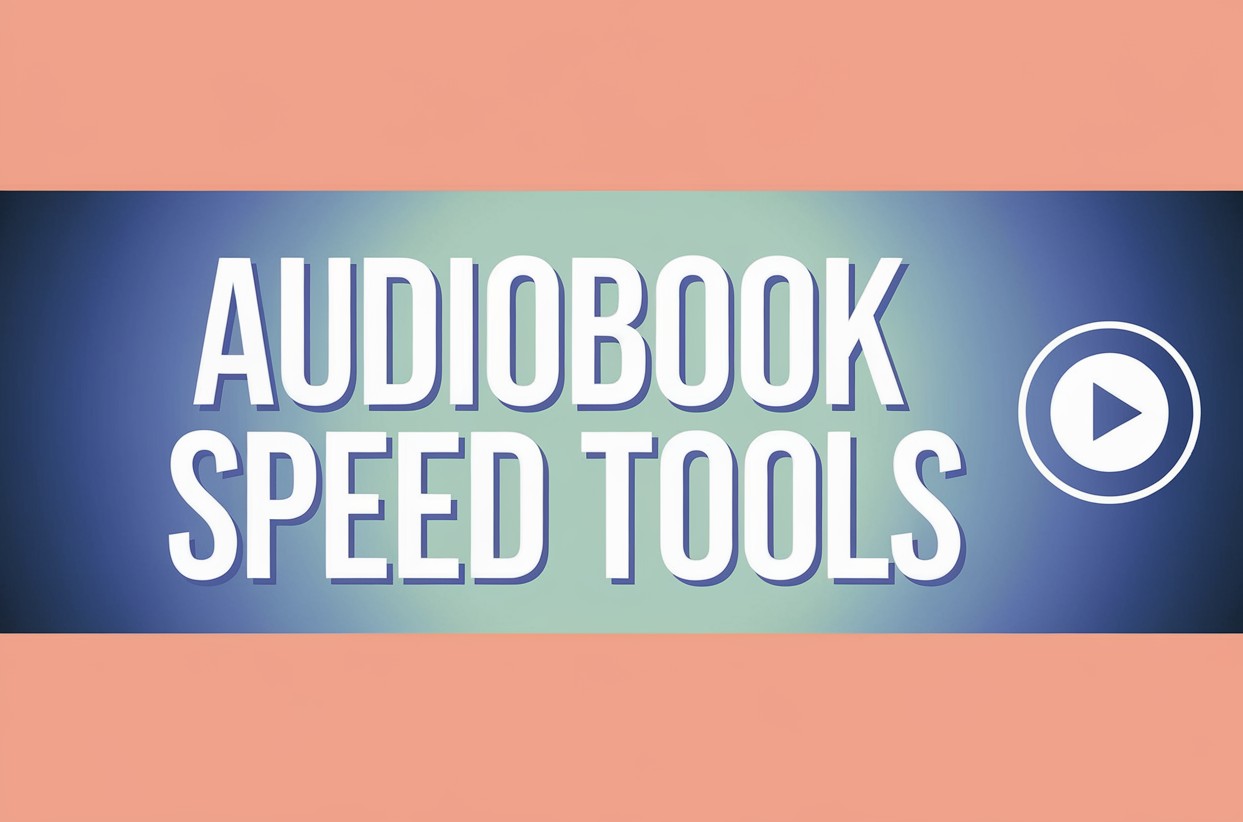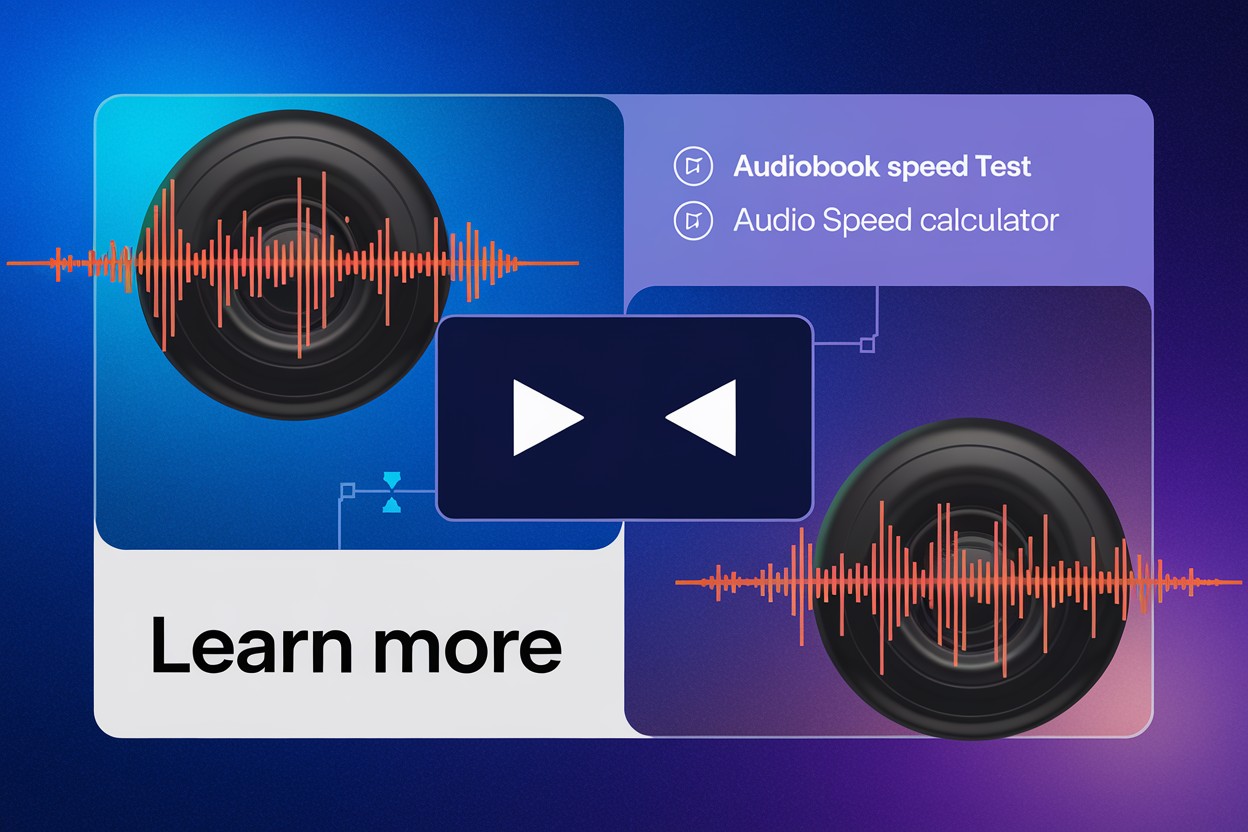
By Lily chen
22 Aug 2024
09
35
Introduction
In today’s fast-paced world, audiobooks have become a popular way for people to consume literature, learn new topics, and stay entertained while on the go. Whether during a commute, workout, or while doing chores, audiobooks offer a convenient way to make use of time that might otherwise be idle.
As more people turn to audiobooks, a new trend is emerging: speed-listening—the practice of listening to audiobooks at increased playback speeds. From 1.5x to 2x (or even faster), many are choosing to speed-listen, allowing them to finish books quicker and consume more content in less time.
The Rise of Audiobooks
The audiobook market has seen significant growth in recent years, fueled by advances in technology, the spread of smartphones, and the increasing availability of digital content. Industry reports suggest that the global audiobook market will continue its rapid expansion as more people discover the convenience and versatility audiobooks offer.
Audiobooks provide several advantages over traditional reading:
- Convenience: Hands-free enjoyment makes audiobooks ideal for multitasking.
- Accessibility: Audiobooks are a great option for individuals with visual impairments or reading difficulties.
- Flexibility: Audiobooks can be consumed in situations where reading a physical book or eBook might not be feasible, such as while driving or exercising. These benefits have led to the growing popularity of audiobooks, and as more people embrace this format, they are also exploring ways to optimize their listening experience—enter speed-listening.
Understanding Speed-Listening
Speed-listening is the practice of increasing the playback speed of audiobooks, allowing listeners to get through content faster than it’s originally narrated. Most modern audiobook apps and devices feature speed adjustment options, typically allowing users to increase the speed to 1.25x, 1.5x, 2x, or even higher.
The idea behind speed-listening is simple: by listening at a faster rate, you can finish audiobooks more quickly, making it possible to consume more books in a shorter amount of time. For instance, a 10-hour audiobook can be completed in just over 6.5 hours at 1.5x speed, or in 5 hours at 2x speed.
Speed-listening is especially popular among those looking to maximize their productivity. Whether it's professionals needing to stay updated on industry trends, students preparing for exams, or avid readers with long reading lists, speed-listening offers a way to get through content more efficiently.
Why More People Are Choosing to Speed-Listen As speed-listening gains popularity, it’s important to understand what’s driving this trend. Below are some key reasons why more people are adopting this approach to audiobook consumption:
- Time Management In our fast-paced world, time is a precious commodity. Many people juggle work, family, and personal development, leaving little time for leisure activities like reading. Speed-listening offers a solution by allowing individuals to “read” more books in less time, maximizing their productivity.
Listening to audiobooks at 1.5x or 2x speed can turn a long commute or workout session into an opportunity to knock out a few chapters of a book. This ability to efficiently manage time without sacrificing the enjoyment or educational value of reading is a major attraction for speed-listeners.
- Enhanced Content Consumption Efficiency Speed-listening allows users to absorb more information in a shorter period, which is particularly useful for consuming non-fiction content, such as business books, self-help guides, or academic material. The ability to process and understand complex information at an accelerated pace can be a game-changer for professionals and students alike.
In many cases, the increased speed does not significantly impact comprehension, especially for content that is straightforward or familiar. This means that listeners can effectively double their reading output without a corresponding drop in understanding.
- Improved Focus and Attention Ironically, listening to audiobooks at a faster speed can help some people maintain better focus. Slower narration can sometimes cause the mind to wander, leading to distractions. By speeding up the playback, listeners may find that they are more engaged and attentive, as the quicker pace requires them to stay mentally active.
This heightened level of engagement can make the listening experience more immersive and enjoyable, particularly for those who might struggle with maintaining focus during slower-paced narration.
- Personalized Listening Experience Speed-listening allows users to tailor their audiobook experience to their individual preferences. Some people naturally prefer a faster pace, while others may want to slow down for particularly dense or poetic material. The ability to adjust playback speed offers a level of control that enhances the overall listening experience, making it more personal and enjoyable.
Potential Challenges of Speed-Listening
While speed-listening offers many benefits, it isn't without its challenges. Here are some potential drawbacks to consider:
- Impact on Content Absorption and Comprehension One of the primary concerns with speed-listening is the potential for reduced comprehension, especially at higher speeds. While many listeners can comfortably handle 1.5x or 2x speed, pushing beyond this may lead to a loss of nuance or the inability to fully grasp complex ideas. This is particularly true for dense material that requires careful consideration.
Listeners should be mindful of the type of content they are consuming and adjust the speed accordingly. For example, while a self-help book might be easily digestible at 2x speed, a literary classic with more intricate language and themes might require a slower pace to fully appreciate.
- Risk of Missing Details When listening at accelerated speeds, there is a higher likelihood of missing out on important details or subtle cues in the narration. This can be especially problematic for fiction, where the emotional tone, character development, and narrative pacing are essential to the overall experience.
Listeners who are new to speed-listening should start with a moderate increase in speed and gradually adjust to faster rates, ensuring they don't sacrifice the richness of the content in the process.
- Emotional Experience and Literary Enjoyment Slowing down allows readers to savor the language, rhythm, and emotion of a well-crafted story. Speed-listening can sometimes detract from the emotional impact of certain passages, particularly in literary or poetic works where the pace of the narration contributes significantly to the overall experience.
For those who enjoy the immersive experience of a well-told story, it might be better to reserve speed-listening for more straightforward or informational content and listen to literary works at a more natural pace.
How to Effectively Use Speed-Listening
To get the most out of speed-listening, it’s important to approach it strategically. Here are some tips to help you optimize your experience:
- Start Slow and Gradually Increase Speed If you're new to speed-listening, start with a slight increase in speed—perhaps 1.25x—and gradually work your way up. This allows your brain to adjust to the faster pace without overwhelming your ability to process the information.
Over time, you may find that you can comfortably listen at 1.5x or 2x speed without losing comprehension. However, there’s no need to push yourself to higher speeds if it starts to impact your enjoyment or understanding of the content.
- Choose the Right Content Not all content is suitable for speed-listening. Non-fiction books, podcasts, or lectures that focus on straightforward information or familiar topics are often easier to process at faster speeds. On the other hand, fiction, poetry, and content with complex ideas or language might be better enjoyed at a slower pace.
Experiment with different types of content to find what works best for you at various speeds.
- Use Tools to Optimize Your Listening One useful tool for optimizing your speed-listening experience is the Audiobook Speed Calculator. This website allows you to calculate the ideal playback speed based on your available listening time and the length of the audiobook. By inputting these details, you can determine the most efficient speed to use without compromising on content absorption.
The Audiobook Speed Calculator is particularly helpful for listeners who want to manage their time effectively and get through their reading list more quickly. It provides a simple way to balance speed and comprehension, ensuring you get the most out of your audiobooks.
Conclusion
As audiobooks continue to grow in popularity, speed-listening is becoming an increasingly common practice. This approach offers a way to consume more content in less time, making it an appealing option for busy professionals, students, and anyone looking to maximize their productivity. However, it’s important to approach speed-listening with care, ensuring that you maintain comprehension and enjoyment while tailoring your listening experience to your personal preferences.
With tools like the Audiobook Speed Calculator, you can find the perfect balance between speed and understanding, allowing you to make the most of your audiobook experience. Whether you’re looking to breeze through your reading list or simply make better use of your time, speed-listening offers a powerful way to achieve your goals.
Frequently Asked Questions (FAQ)
Q: Will speed-listening affect my comprehension of the content?
A: For many people, listening at 1.5x or 2x speed does not significantly impact comprehension, especially for straightforward content. However, more complex material might require a slower pace to fully absorb the details.
Q: What is the best speed for speed-listening?
A: The best speed varies depending on the individual and the type of content. It’s recommended to start at 1.25x or 1.5x and adjust based on your comfort level and comprehension.
Q: Can speed-listening damage my hearing?
A: Speed-listening itself does not damage hearing, but it’s important to listen at a safe volume, especially when using headphones for extended periods.
Q: Where can I find platforms that support speed-listening?
A: Most major audiobook platforms, such as Audible, Google Play Books, and Apple Books, offer speed adjustment features. Additionally, many podcast apps also allow for speed control.

Related Articles
How to Increase the Playback Speed of an Audiobook
Learn how to efficiently increase audiobook playback speed across various platforms and optimize your listening experience with helpful tools like the Audiobook Speed Test and Audio Speed Calculator.
Why More People Are Speed-Listening to Audiobooks
Discover the reasons behind the growing trend of speed-listening and how you can optimize your audiobook experience with tools like the Audio Speed Calculator.
